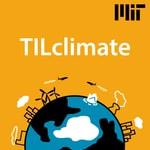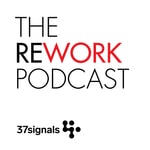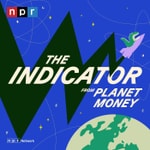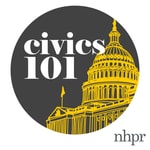TILclimate – Details, episodes & analysis
Podcast details
Technical and general information from the podcast's RSS feed.

TILclimate
MIT Environmental Solutions Initiative
Frequency: 1 episode/34d. Total Eps: 70

Recent rankings
Latest chart positions across Apple Podcasts and Spotify rankings.
Apple Podcasts
🇬🇧 Great Britain - naturalSciences
28/07/2025#35🇺🇸 USA - naturalSciences
28/07/2025#56🇫🇷 France - naturalSciences
28/07/2025#43🇨🇦 Canada - naturalSciences
27/07/2025#99🇬🇧 Great Britain - naturalSciences
27/07/2025#72🇺🇸 USA - naturalSciences
27/07/2025#60🇫🇷 France - naturalSciences
27/07/2025#36🇨🇦 Canada - naturalSciences
26/07/2025#82🇬🇧 Great Britain - naturalSciences
26/07/2025#54🇺🇸 USA - naturalSciences
26/07/2025#56
Spotify
No recent rankings available
Shared links between episodes and podcasts
Links found in episode descriptions and other podcasts that share them.
See all- https://www.sessions.blue/
1003 shares
- https://sessions.blue/
67 shares
- https://twitter.com/DaveResonates
131 shares
- https://twitter.com/TILclimate
2 shares
RSS feed quality and score
Technical evaluation of the podcast's RSS feed quality and structure.
See allScore global : 73%
Publication history
Monthly episode publishing history over the past years.
2°C: the story of the global climate goal
Season 6 · Episode 10
jeudi 6 juin 2024 • Duration 16:06
The landmark Paris Agreement of 2015 gave the world a shared target for halting climate change: that global warming should stop well short of 2 degrees Celsius. But how did that target come about, and what exactly does it mean? Prof. Maria Ivanova, a specialist in international environmental policy, shares with us the history and diplomacy behind those crucial 2 degrees.
For a deeper dive and additional resources related to this episode, visit:
For more episodes of TILclimate by the MIT Environmental Solutions Initiative, visit tilclimate.mit.edu.
Credits
Laur Hesse Fisher, Host and Executive Producer
David Lishansky, Editor and Producer
Aaron Krol, Writer and Producer
Lindsay Fendt, Science Reporter
Michelle Harris, Fact Checker
Music by Blue Dot Sessions
Artwork by Aaron Krol
Slow carbon, fast carbon
Season 6 · Episode 9
jeudi 30 mai 2024 • Duration 09:43
The Earth naturally absorbs some of our climate pollution from burning fossil fuels. But how much, and how fast? Geophysicist Prof. Daniel Rothman joins the podcast to explain the nature and scale of the natural carbon cycle, and how our appetite for fossil fuels has pushed it out of balance.
For a deeper dive and additional resources related to this episode, visit:
For more episodes of TILclimate by the MIT Environmental Solutions Initiative, visit tilclimate.mit.edu.
Credits
Laur Hesse Fisher, Host and Executive Producer
David Lishansky, Editor and Producer
Aaron Krol, Writer and Producer
Andrew Moseman, Science Reporter
Michelle Harris, Fact Checker
Music by Blue Dot Sessions
Artwork by Aaron Krol
Season 6 Preview: Something a Little Different
Season 6
vendredi 15 mars 2024 • Duration 01:49
The sixth season of Today I Learned: Climate is coming in two weeks, and this time we’re doing something a little different. People all around the world write into our team with questions about climate change. So this season, we’re working with scientists and experts at MIT and beyond, to answer those questions in language we can all understand.
Why does it take five years to build a wind farm?
Season 5 · Episode 8
jeudi 7 décembre 2023 • Duration 15:49
The United States has a goal to power the country with 100% clean electricity by 2035. Unfortunately, our energy regulations are not set up to make this much change this quickly. Energy economist John Parsons of MIT joins the show to explain how much clean energy infrastructure we need to build, the obstacles to building it, and reform ideas to transform our energy system on the timeline our climate goals demand.
For a deeper dive and additional resources related to this episode, visit: https://climate.mit.edu/podcasts/e8-why-does-it-take-five-years-build-wind-farm
For more episodes of TILclimate by the MIT Environmental Solutions Initiative, visit tilclimate.mit.edu.
Credits
Laur Hesse Fisher, Host and Producer
David Lishansky, Editor and Producer
Aaron Krol, Scriptwriter and Associate Producer
Ilana Hirschfeld, Production Assistant
Sylvia Scharf, Education Specialist
Michelle Harris, Fact Checker
Music by Blue Dot Sessions
Artwork by Aaron Krol
Energy storage: keeping the lights on with a clean electric grid
Season 5 · Episode 7
jeudi 30 novembre 2023 • Duration 14:43
The large majority of new energy we’re building today comes from clean, renewable wind and solar projects. But to keep building wind and solar at this pace, we need energy storage: technologies that save energy when the weather is favorable, and use it when wind and sun are scarce. Prof. Asegun Henry joins TILclimate to explain how energy storage works, what storage technologies are out there, and how much we need to build to make wind and solar dominant.
For a deeper dive and additional resources related to this episode, visit: https://climate.mit.edu/podcasts/e7-energy-storage-keeping-lights-clean-electric-grid
For more episodes of TILclimate by the MIT Environmental Solutions Initiative, visit tilclimate.mit.edu.
Credits
Laur Hesse Fisher, Host and Producer
David Lishansky, Editor and Producer
Aaron Krol, Scriptwriter and Associate Producer
Ilana Hirschfeld, Production Assistant
Sylvia Scharf, Education Specialist
Michelle Harris, Fact Checker
Music by Blue Dot Sessions
Artwork by Aaron Krol
A public health expert’s guide to climate change
Season 5 · Episode 6
jeudi 16 novembre 2023 • Duration 12:12
We all want to live full, healthy lives. But climate change is threatening a growing number of people’s lives and well-being. Amruta Nori-Sarma, assistant professor of environmental health at Boston University School of Public Health, joins the show to help us see climate change not in tons of carbon dioxide, but as a matter of health.
For a deeper dive and additional resources related to this episode, visit: https://climate.mit.edu/podcasts/e6-public-health-experts-guide-climate-change
For more episodes of TILclimate by the MIT Environmental Solutions Initiative, visit tilclimate.mit.edu.
Credits
Laur Hesse Fisher, Host and Producer
David Lishansky, Editor and Producer
Aaron Krol, Scriptwriter and Associate Producer
Ilana Hirschfeld, Production Assistant
Sylvia Scharf, Education Specialist
Michelle Harris, Fact Checker
Music by Blue Dot Sessions
Artwork by Aaron Krol
TILclimate presents: What the heck is El Niño, anyway? (from Outside/In)
Season 5
jeudi 9 novembre 2023 • Duration 21:28
We were going to produce an episode on El Niño, and its relationship to climate change. And then we found out that Outside/In, from New Hampshire Public Radio, already did that. And they did a really good job. So please enjoy this episode of Outside/In, where you'll learn what El Niño is, how to tell if extreme weather events are caused by climate change or by El Niño, and what the powerful El Niño event of 2023 can tell us about our climate future.
Outside/In is a production of NHPR, New Hampshire Public Radio, a podcast where curiosity and the natural world collide. In addition to their regular program, they have run special limited series covering issues from the offshore wind industry to lawns and gardens to Canadian hydropower.
Learn more at outsideinradio.org.
Wildfires and how we're changing them
Season 5 · Episode 5
jeudi 2 novembre 2023 • Duration 13:38
If you live in the U.S. Mountain West, the Pacific Coast of the Americas, or large parts of Australia or southern Europe, there’s a good chance a major wildfire has passed near you in the last five or six years—maybe one more intense than anything you’ve ever heard of in your area. But why exactly are wildfires getting worse? Is climate change entirely to blame? And what should we be preparing for next? Dr. Daniel Swain joins the TILclimate podcast to help break down what is going on with wildfires and climate change.
For a deeper dive and additional resources related to this episode, visit: https://climate.mit.edu/podcasts/e5-wildfires-and-how-were-changing-them
For more episodes of TILclimate by the MIT Environmental Solutions Initiative, visit tilclimate.mit.edu.
Credits
Laur Hesse Fisher, Host and Producer
David Lishansky, Editor and Producer
Aaron Krol, Scriptwriter and Associate Producer
Ilana Hirschfeld, Production Assistant
Sylvia Scharf, Education Specialist
Michelle Harris, Fact Checker
Music by Blue Dot Sessions
Artwork by Aaron Krol
Can desalination solve water scarcity?
Season 5 · Episode 4
jeudi 26 octobre 2023 • Duration 14:24
Today we’re talking about desalination: turning saltwater into freshwater, so we can drink it or use it to grow crops. And we’re talking about this because, in many parts of the world, freshwater is getting harder to come by. So… is converting saltwater a good solution? Our guest Prof. John Leinhard has devoted his whole career to this question—and its relationship with climate change.
For a deeper dive and additional resources related to this episode, visit: https://climate.mit.edu/podcasts/e4-can-desalination-solve-water-scarcity
For more episodes of TILclimate by the MIT Environmental Solutions Initiative, visit tilclimate.mit.edu.
Credits
Laur Hesse Fisher, Host and Producer
David Lishansky, Editor and Producer
Aaron Krol, Scriptwriter and Associate Producer
Ilana Hirschfeld, Production Assistant
Sylvia Scharf, Education Specialist
Michelle Harris, Fact Checker
Music by Blue Dot Sessions
Artwork by Aaron Krol
Don’t throw away your refrigerator
Season 5 · Episode 3
jeudi 19 octobre 2023 • Duration 14:45
Refrigerants are in every refrigerator, freezer and air conditioner, and the world is on track to make a lot more of them in the years to come. They’re also powerful greenhouse gases: often thousands of times more warming than carbon dioxide. Prof. Ronald Prinn, an expert in the physics and chemistry of our climate system, joins TILclimate to discuss the past, present and future of how these chemicals affect our planet.
For a deeper dive and additional resources related to this episode, visit: https://climate.mit.edu/podcasts/e3-dont-throw-away-your-refrigerator
For more episodes of TILclimate by the MIT Environmental Solutions Initiative, visit tilclimate.mit.edu.
Credits
Laur Hesse Fisher, Host and Producer
David Lishansky, Editor and Producer
Aaron Krol, Scriptwriter and Associate Producer
Ilana Hirschfeld, Production Assistant
Sylvia Scharf, Education Specialist
Michelle Harris, Fact Checker
Music by Blue Dot Sessions
Artwork by Aaron Krol









